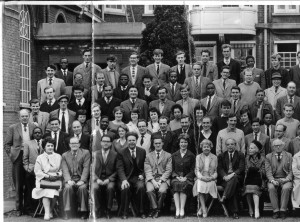Joe, The Shop Steward For Former MPs
First, Joe in full flight. Then, Christine Smith (Chair, Dronfield Labour Party), Joe Ashton and me.


The photos are from our latest discussion meeting, which was addressed by Joe Ashton. He has always been a popular speaker in Dronfield, having in the past addressed a local May Day Rally and a packed public meeting. It was no surprise that he doubled the average size of our attendance.
Joe was the MP for Bassetlaw in North Nottinghamshire for over 32 years. After he left the Commons, he helped to establish the Association of Former Members of Parliament gaining a positive response to his initiative from Michael Martin, the Speaker of the Commons as well as from many of his past colleagues.
A survey of former MPs was conducted on behalf of the Association by the School of Politics and International Studies at Leeds University where 343 members of the Association were issued with a questionnaire. Copies of the Leeds University report which was published in October 2007 were circulated at our meeting. As were copies of the Associations magazine "Order! Order!".
Although some MPs (as I did) announced their retirement well in advance and prepared to move into either retirement or a fresh career, others faced the trauma of losing their jobs in the glare of often adverse publicity. This can occur contrary to expectations, with a former MP often then having immediately to start from scratch to build a fresh life.
Whilst in our current era of the credit crunch and major job-losses, people may not see MPs to be a special case; Joe is keen that a body should be maintained which can seek to further ex-MPs' concerns and draw upon their past experiences. The average shelf life of an MP on the parliamentary benches is only 8 years, so the rapid turn over is likely to involve many hidden problems. On top of this, former MPs have developed interests and areas of expertise that should not just be thrown to one side.
Joe was christened as the MPs' shop steward during his time as an MP. It is, therefore, entirely appropriate that he should continue that role during his own retirement on behalf of his fellow former MPs.
As would be expected, the bulk of the time at our Dronfield discussion meetings is taken up with debating our speaker's presentation. However as Joe was well known to everyone as a former columnist, author, playwright, frontbencher and Sheffield Wednesday supporter; the discussions were bound to go well beyond the initial scope of his presentation. But as with all worthwhile discussion meetings, people left buzzing and continued their own discussions in groups. Which is exactly what discussion meetings are supposed to be about.


The photos are from our latest discussion meeting, which was addressed by Joe Ashton. He has always been a popular speaker in Dronfield, having in the past addressed a local May Day Rally and a packed public meeting. It was no surprise that he doubled the average size of our attendance.
Joe was the MP for Bassetlaw in North Nottinghamshire for over 32 years. After he left the Commons, he helped to establish the Association of Former Members of Parliament gaining a positive response to his initiative from Michael Martin, the Speaker of the Commons as well as from many of his past colleagues.
A survey of former MPs was conducted on behalf of the Association by the School of Politics and International Studies at Leeds University where 343 members of the Association were issued with a questionnaire. Copies of the Leeds University report which was published in October 2007 were circulated at our meeting. As were copies of the Associations magazine "Order! Order!".
Although some MPs (as I did) announced their retirement well in advance and prepared to move into either retirement or a fresh career, others faced the trauma of losing their jobs in the glare of often adverse publicity. This can occur contrary to expectations, with a former MP often then having immediately to start from scratch to build a fresh life.
Whilst in our current era of the credit crunch and major job-losses, people may not see MPs to be a special case; Joe is keen that a body should be maintained which can seek to further ex-MPs' concerns and draw upon their past experiences. The average shelf life of an MP on the parliamentary benches is only 8 years, so the rapid turn over is likely to involve many hidden problems. On top of this, former MPs have developed interests and areas of expertise that should not just be thrown to one side.
Joe was christened as the MPs' shop steward during his time as an MP. It is, therefore, entirely appropriate that he should continue that role during his own retirement on behalf of his fellow former MPs.
As would be expected, the bulk of the time at our Dronfield discussion meetings is taken up with debating our speaker's presentation. However as Joe was well known to everyone as a former columnist, author, playwright, frontbencher and Sheffield Wednesday supporter; the discussions were bound to go well beyond the initial scope of his presentation. But as with all worthwhile discussion meetings, people left buzzing and continued their own discussions in groups. Which is exactly what discussion meetings are supposed to be about.


 Ruskin College Students and Staff 1962. Shortly after I had completed my studies there.
Ruskin College Students and Staff 1962. Shortly after I had completed my studies there.